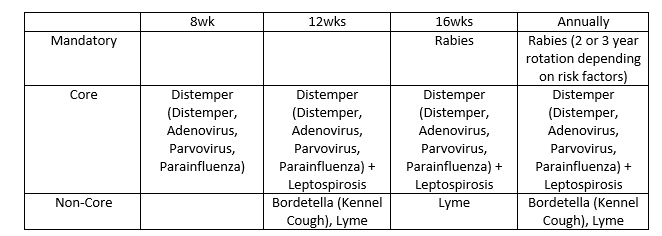Congratulations! Getting a new puppy is an exciting life event, but it also comes with a lot of questions and unknowns. The staff at the Mildmay Veterinary Clinic want to make sure you leave here with your questions answered and your head filled with knowledge on what is best for your new furry family member.
What is a Wellness Exam and why is it important?
Our veterinarians and technicians will perform a full physical exam at every visit. We will do a thorough nose to tail exam and also address any concerns that you might have. We will discuss nutrition, behaviour changes and what to expect from your new family member!
- Ears: Identify signs of infection, polyps or parasites.
- Eyes: We look for ocular disease, cataracts, conjunctival disease, and ulcers. We may recommend testing ocular pressures, tear production or stain the eye to look for ulcers.
- Mouth: We will check for an overbite or under bite, make sure all of your pet’s teeth are coming in as they should, and ensure there are no dental abnormalities. We will also check for a cleft palate.
- Skin/Coat: Identifying parasites, infections, yeast, allergies, dry or greasy skin. We may also find lumps or bumps that go unidentified under the coats of many of our pets. We will also feel your pet’s lymph nodes and ensure they are normal size.
- Body condition: We will give your pet a body condition score and help you ensure your pet maintains an ideal body weight.
- Heart/Lungs: This is important to ensure your pet has a normal heart rate and rhythm. Heart murmurs and arrhythmias can be identified.
- Abdominal palpation: We are able to palpate your pet’s abdomen to identify possible areas of concern such as enlarged organs or internal masses and we will also assess for any pain. We will ensure that your pet does not have a hernia.
- Temperature: We will take your pet’s temperature.
- Weight: We keep track of your pet’s weight at every visit. A change in weight can indicate underlying disease in your pet.
Your puppy will get a thorough health examination at every vaccination visit. It is important to make sure your puppy is nice and healthy prior to vaccination.
Vaccinations
Puppies should be vaccinated with a series of vaccines at 8, 12 and 16 weeks of age, then annually from there on. Non-core vaccine administration will be based on the risk of exposure and your veterinarian will help you decide how frequently these vaccines should be given to your pet. Core vaccines include canine distemper virus, canine adenovirus, and canine parvovirus (these are combined into one needle that we refer to as the “Distemper” vaccine) as well as rabies virus.
Non-core vaccination includes Bordetella (kennel cough), Lyme disease and Leptospirosis. Due to the increased prevalence of Leptospirosis in the area, we vaccinate dogs with a Distemper/Leptospirosis combination vaccine annually once boosted properly as a puppy. Below is a chart to help simplify what vaccines you need to give and their preferred age to be given:
***Note: Rabies can be 1st given at the age of 16 weeks and lasts for 1 year. A booster then needs to be given one year later to extend the rabies vaccine to have on a 3-year rotation protocol. This protocol can only be achieved if the rabies booster is given within 365 days of the 1st. If on the 3rd year of your rotation the rabies is missed by even one day, it will only be valid for 1 year until boosted properly again.
Fecal Examination
Checking a fecal sample is important to check your puppy for parasites. Most puppies have roundworms. The purpose of the fecal exam is to look for other parasites that might require different de-worming. Parasites are often not visible to the naked eye and checking for eggs under the microscope is very important. Parasites may cause diarrhea, unthriftiness, a potbellied appearance, anemia and some parasites are zoonotic which means they are transmissible to humans! Routine deworming and fecal examinations are recommended for all pets.
Parasite Preventions
Your pets can be the host to many internal and external parasites without you even knowing. Some of these parasites include fleas, ticks, and heartworms. Fleas do not carry any diseases but having an infestation in your home is tedious to try to eliminate. Fleas can potentially be fatal if your puppy is small and the infestation is large enough to cause them to become anemic as fleas feast on the blood of their host. Fleas, if ingested by your pet can lead to tapeworms as well which live in your pets’ intestines and are often seen as white segments of rice on the fur around your pets bum and even bedding.
Ticks are becoming more prevalent in our area. Prevention will help reduce the risk of the transmitting of tick borne diseases to your pet. Some of the MANY diseases that ticks can transmit are Lyme Disease, Rocky Mountain Spotted Fever, and Anaplasmosis. You can also get your pet vaccinated against Lyme disease to help prevent them from contracting the disease.
Heartworm is a serious condition caused by parasitic worms that live in the heart and blood vessels. Pets can get heartworm disease from mosquitoes that are infected with heartworm parasites. An infected mosquito may bite your dog and inject immature worms into your dog through its saliva. The immature worms migrate to the lungs and heart where they cause significant damage and mature into adults that can be up to 30 cm long! Unfortunately, this condition can be fatal. The good news is that it can easily be prevented through regular testing and preventive medication. Treatment for heartworm disease is expensive and challenging – therefore prevention is key!
Prevention for these parasites includes a pill, a topical medication that gets absorbed into the skin, or a combination of the two, once monthly between May to November (depending on the weather). Your veterinarian will help you decide what your dog is at risk of and customize a parasite prevention program to their needs.
Spaying and Neutering
“Why should I spay or neuter my pet?”
Spaying or neutering your pet is important for a variety of reasons. Pets that are not neutered are more prone to roaming and at higher risk of being hit by a car. Unneutered pets are more prone to fighting and at increased risk of aggressive behaviour to other animals and to people. Unwanted behaviours such as urine marking in the house can be avoided by neutering your pet. These procedures have many health benefits to your pet- they decrease the risk of certain types of cancers (mammary, testicular, prostate, etc.) and eliminate the risk of a pyometra, a life threatening condition that occurs when an infection gets trapped in the uterus.
Neutering and spaying your pet eliminates the risk of unplanned pregnancies and unwanted pets. Although the idea of “having one litter” seems appealing to some, the cost of an emergency caesarean section if needed is upward of $2500. With the number of pets already looking for their forever homes in shelters throughout our area, why add to the already significant population? Please give us a call and we can discuss the procedure with you. Every pet and circumstance are different and we will help you decide if/when your pet should be spayed/neutered.



